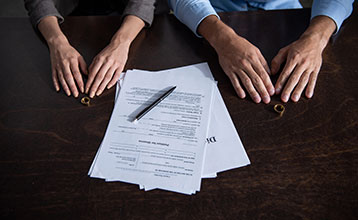Many of us understand the importance of creating a will. We want to ensure our children and our estate will be well taken care of after passing away. In addition, we wish to make things easier for our family members, and we fear potential family disputes over the administration of our estate. A well-drafted will prepares for the eventuality of one’s passing and puts everyone at ease of mind.
In the same way, a Lasting Power of Attorney (LPA) is just as important a document for anyone who wishes to manage their personal affairs well.
What is a Lasting Power of Attorney (LPA)?
An LPA is a legal document that allows you (the donor) to appoint one or more persons (the donee) to act on your behalf and manage your affairs should you lose your mental capacity.
The loss of one’s mental capacity is defined under the Mental Capacity Act as someone who has become “unable to make a decision for himself in relation to the matter because of an impairment of, or a disturbance in the functioning of, the mind or brain.”
It is irrelevant whether the person’s mental impairment is a permanent or temporary one. Thus, for example, if the donor were to suffer a head injury and be deemed mentally incapacitated by a doctor, his donee can still rely on the LPA and make certain decisions on his behalf during the period of his mental incapacitation, even if the donor were to recover fully a few weeks later.
Therefore, the donor should be very selective when appointing his donee(s) and choose competent persons who can be trusted to act in the donor’s best interests.
What are the requirements for someone to make an LPA?
You are qualified to make an LPA as long as you:
- Are at least 21 years old;
- Have the mental capacity to create the LPA; and
- Are not an undischarged bankrupt if you are making an LPA for property and affairs matters.
Why should you make an LPA?
Just as nobody can predict the day of one’s death, we can also never know when we might lose our mental capacity due to illnesses such as dementia or Alzheimer’s. We should also not be so brash as to think that mental impairment only affects the elderly. Car accidents and other events can also result in young persons becoming incapacitated or comatose. It would be prudent for anyone eligible to make an LPA to do so.
If you lose your mental capacity without making an LPA, there could be several undesirable consequences.
You protect your family from unnecessary stress.
Firstly, anyone without mental capacity becomes unable to manage their personal and financial affairs. This is especially burdensome; you have many responsibilities and dependents relying on you, such as elderly parents or your wife and children. If you lose your mental capacity, there is no automatic right given to your family members to manage your personal affairs or your money. If there has been no LPA created, your family members would have no choice but to apply to the court for an order to appoint someone to administer your affairs, also known as the court-appointed deputy. The process of applying for a deputyship is far more tedious and expensive than it would be to make an LPA, and the application process would undoubtedly cause much stress and inconvenience to your family.
Your donor has more resources to care for you
Secondly, having an LPA does not only ensure that your family’s interests are taken care of if you become mentally incapacitated, but it also protects your own welfare. If you have granted your donee the authority to manage your property and affairs, your donee would have easier access to your bank accounts and also be able to make insurance claims on your behalf. This would enable your donee to pay for your medical and other related expenses, allowing you to receive the necessary care and treatment as soon as possible.
You ensure your donee is the right person for you
Thirdly, while the court will exercise caution in choosing the most suitable deputy, there is the possibility that the court-appointed deputy is someone you would not want making decisions on your behalf. This deputy may not know you very well and will be unfamiliar with your beliefs and preferences and end up making decisions on your behalf that you would disagree with. Making an LPA and appointing your own donees would avoid this issue.
What decisions can a donee make for me?
There are 2 areas in which a donor can grant their donee(s) powers to make decisions on their behalf:
- Their personal welfare; and/or
- Their property and affair matter.
Personal welfare decisions that the donee may make on the donor’s behalf involve the day-to-day affairs of the donor and include:
- Where the donor is to live;
- Which persons the donor may come into contact with;
- The type of healthcare the donor should receive;
- What the donor wears and eats;
- What activities the donor takes part in.
Property and affairs decisions that the donee may make on the donor’s behalf concern the donor’s property and finances and include:
- Having access to the donor’s bank accounts and managing his financial matters such as investments and tax;
- Management of the donor’s property, including its sale, rent, or mortgage;
- Maintaining and providing for the donor’s spouse, children, and parents;
- Continuing the donor’s profession, trade or business.
Who is eligible to be appointed as a donee?
Appointed donees can be either non-professional or professional. It can also be a combination of the two types. For example, the donor chooses his child to be his non-professional donee managing his personal welfare but appoints a professional donee to manage his property and affairs. However, there are important requirements and differences between appointing non-professional and professional ones concerning the types of matters they are allowed to manage.
Non-professional donees
Non-professional donees are individuals at least 21 years old and provide their services as a donee without remuneration. Generally, non-professional donees are allowed to manage both the donor’s personal welfare and property and affairs. However, if the appointed non-professional donee is/becomes an undischarged bankrupt, he is disallowed from managing the donor’s property and affairs but may continue managing personal welfare matters.
Professional donees
A professional donee can be an individual or an organisation that provides their services on a paid basis. Professional donees have to be registered and generally come from professions with the relevant skills and experience to be competent such as lawyers, doctors, social workers, and accountants. Donors that choose to appoint professional donees are typically singles or divorced persons who may not have close family or friends that they would trust to be their proxy decision-makers.
Professional donees who are individuals can manage personal welfare and property and affairs but must not be related to the donor by blood or marriage. On the other hand, professional donees, which are organisations, cannot manage the donor’s personal welfare, only the donor’s property and affairs.
How do I apply for an LPA?
Step 1: Complete the relevant form
There are 2 types of prescribed forms provided on the Office of the Public Guardian (OPG) website. Form 1 is the standard form that grants general powers to the donee with some basic restrictions. Form 2 allows the donor to customise and specify the powers to be granted to the donee.
If you wish to use Form 2, you are required to engage the services of a lawyer to assist you with the drafting of the specific terms of the donee’s powers, which will then be attached to Form 2 as an annex.
The OPG has recently revised the LPA forms and from its previous 2014 version to its current 2020 version. The revision was implemented only to make the LPA Forms more user-friendly, making changes such as larger fonts and simplifying legal and technical jargon. The revision has not resulted in any changes to the substantive contents of the LPA Forms. You may wish to refer to the list of FAQs for the LPA Form (2020) for more information.
Step 2: Certify the Form
After you have completed the relevant form, you will need to have a certificate issuer certify the form for you. The certificate issuer can be a practising lawyer, a psychiatrist, or an accredited doctor. If you have chosen to use Form 2 for your LPA, you may have the same lawyer who also drafted your LPA’s powers to certify the LPA. The certificate issuer will generally charge a fee for his services.
The certification process is to ensure that the donor knows the purpose of the LPA and its consequences. It also helps prevent cases where donors have been made to create the LPA due to fraud or undue influence.
Step 3: Register the LPA application
After the completion and certification of the LPA Form, the LPA application has to be mailed to the OPG within 6 months of you signing it.
Upon acceptance of the LPA, OPG will notify you. There will then be a 3-week mandatory waiting period where objections to the LPA may be raised. If no objections are received during the period of time, the LPA will be registered.
The OPG will also be contacting you for payment and other details. Note that the LPA application fee ($75) has been waived for Singaporeans who apply for their LPA using Form 1. However, this waiver lasts only until 31 August 2020. LPAs using Form 2 have an application fee of $200.
I am a donee, and my donor has become mentally incapacitated. How do I use the LPA?
Step 1: Have a doctor certify your donor’s mental capacity
You have to bring the donor to a registered doctor to have his mental condition evaluated. You will also need to bring the donor’s LPA with you. If the doctor is satisfied that the donor is mentally incapacitated, he will produce a medical certificate certifying the same. This medical certificate is the medical Report Form for LPA Transactions and is available on the OPG website.
Step 2: Proceed to the relevant institutions with the necessary documents
Depending on the type of transaction you intend to carry out on the donor’s behalf, you should approach the relevant institution and present the original LPA (either a soft or hard copy) or a certified true copy of it. Thus, if you wish to withdraw funds from the donor’s bank account to maintain his parents, you should proceed to the donor’s bank with the necessary documents.
Different institutions may also have different operating procedures for activating an LPA and may require other documents. Therefore, you should contact them to understand their requirements better.
Contact an experienced LPA lawyer
At PKWA Law, our team of Family Lawyers are consistently named as leading Singapore family by publications such as The Straits Times, Benchmark Litigation Asia Pacific, Straits Times, Asian Legal Business, Singapore Business Review and Doyle’s Guide.
Doing the job of estate planning now is much easier when you have a legal team on your side who understands the LPA process. So when you need help to do up your LPA, please get in touch with us for a consultation.


